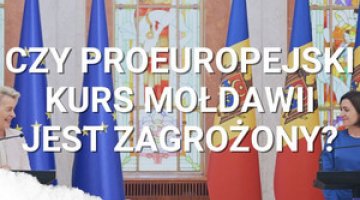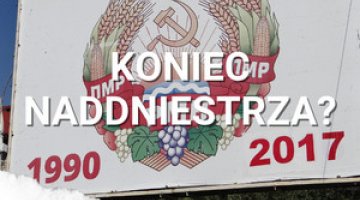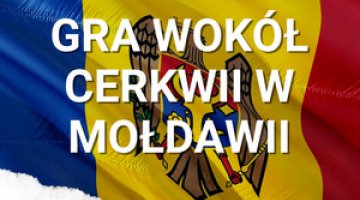The presidential election and referendum in Moldova: a yellow card for the pro-Western camp
On 20 October, Moldova held a presidential election along with a referendum on whether to enshrine the country’s EU integration in its constitution. Maia Sandu, the incumbent president and de facto leader of the ruling pro-Western Party of Action and Solidarity (PAS), received the highest support in the election, with 42.1%. Alexandr Stoianoglo, a former prosecutor general backed by the pro-Russian Party of Socialists (PSRM), came second with 26.3%. Renato Usatîi, the Moscow-linked populist leader of Our Party, finished third with 13.7%. Other candidates garnered less than 5.5% of the vote. The turnout was 51.64%, with as much as 15% of all votes cast by Moldova’s diaspora, which numbers over a million people. In the referendum, with almost 99% of votes counted, supporters of the country’s EU membership held a narrow lead of 50.26%.
Sandu’s prospects for re-election are now in doubt. Despite the strong mobilisation of the diaspora, she failed to secure victory in the first round. While Stoianoglo can expect to win over some of those who voted for Usatîi and several other candidates, Sandu faces strong opposition among voters and, therefore, has few options to attract more voters in the second round. Although the referendum result is positive, it represents a blow to the pro-Western camp’s image, as the PAS government had expected approximately 60% of voters to support EU accession. The pro-Russian opposition is likely to exploit this outcome for propaganda purposes, particularly in the lead-up to the second round of elections.
Commentary
- Sandu’s result should be regarded as worse than expected. Pre-election polls gave her around 35–40% of the vote, but the pro-Western camp hoped to clinch the election in the first round due to the strong mobilisation of the diaspora, 80–90% of whom support the PAS leader. Even though as many as 230,000 votes were cast abroad (compared to 149,000 in the 2020 elections), Sandu failed to come close to the 50% threshold, revealing widespread fatigue with the PAS government. This contributed to the unexpectedly strong performance of her main rival, Stoianoglo, who had been polling at around 20%, and the populist Usatîi.
- Sandu’s poor result is a consequence of the extra-legal actions of Ilan Șor, a fugitive oligarch who represents Russia’s interests (see below), as well as the significant opposition faced by the incumbent president (over 50%). The primary reason behind the declining popularity of Sandu is the economic deterioration experienced over the past two years. Since the outbreak of the Russian-Ukrainian war, gas prices have increased sevenfold, while electricity prices have tripled. A failed reform of the justice system has also seriously damaged the ruling party’s image. Furthermore, despite public expectations, the government has failed to hold accountable the corrupt politicians and oligarchs who have effectively held or shared power in the country in recent years. This year’s launch of EU accession talks is the PAS’s sole political success that has been fully acknowledged by the electorate.
- Sandu faces a difficult path to re-election. Stoianoglo, backed by the socialists but positioning himself as a “centrist” politician who supports the country’s European integration while maintaining good relations with Russia and neutrality in the Ukraine war, can expect to win over some of those who voted for Usatîi and a few other minor candidates. Meanwhile, Sandu has virtually no avenues to secure additional support. Her chances could improve with even stronger mobilisation of the diaspora, similar to the second round of the 2020 elections, when 243,600 of its members voted for her. Furthermore, some voters may shun Stoianoglo due to his ethnic background as a Gagauz.
- The result of the constitutional referendum came as a major surprise to the pro-Western camp. The vast majority of pre-election polls suggested a clear lead for supporters of the country’s European integration. It was anticipated that support for the proposed constitutional changes could reach approximately 60–65%, due to the backing from Moldova’s traditionally pro-Western diaspora, the vast majority of whom live in the EU, UK, or US. However, the actions of the oligarch Ilan Șor likely contributed to the unexpected outcome. Shortly before the election, Moldovan security services revealed that Șor, who controls at least four parties in the country, had used a network of activists and bots to recruit large numbers of Moldovans who agreed to vote against European integration in exchange for payments of around €25. An estimated 130,000 people, representing over 10% of all those who voted last Sunday, were reportedly involved in this scheme. After the election, Sandu claimed that the oligarch had attempted to recruit up to 300,000 voters.
- Pro-Russian forces will use the referendum result to challenge the government’s pro-European policies. The narrow margin between the supporters and opponents of the country’s EU integration will likely serve as a pretext for demands to recount the votes and accusations of electoral fraud. Additionally, the opposition and Russian propaganda will capitalise on the fact that the diaspora ultimately decided the outcome, arguing that the country’s future was determined not by its residents, but by emigrants living abroad. This narrative will be particularly emphasised in the run-up to the second round of the presidential election, with the aim of undermining Sandu’s re-election bid.




